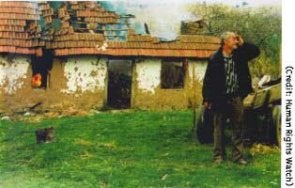
KOSOVO
FOCUS ON HUMAN RIGHTS
 War Crimes in Kosovo
War Crimes in Kosovo
The International Criminal Tribunal for the former Yugoslavia (ICTY) was founded in May 1993 to prosecute war crimes committed during the wars in former Yugoslavia beginning in 1991. As of July 1998, eighty individuals had been publicly indicted, as had others in a number believed to be charged under sealed indictments. Twenty-eight individuals were in custody, and two had been convicted.
Article 1 of the Tribunal's statute states that the Tribunal has the power to prosecute individuals who have committed violations of international humanitarian law on the "territory of the former Yugoslavia since 1991." Article 8 further specifies that the Tribunal's temporal jurisdiction "shall extend to a period beginning on 1 January 1991." There is no end point to this temporal jurisdiction.
Violations of international humanitarian law committed in Kosovo may be investigated and prosecuted by the Tribunal.
In a March 10, 1998 press release the prosecutor's office at the Tribunal stated publicly that the Tribunal is empowered to "prosecute persons responsible for serious violations of international humanitarian law committed in the territory of the former Yugoslavia since 1991. This jurisdiction is ongoing and covers the recent violence in Kosovo."
On July 7, 1998, Chief Prosecutor of ICTY, Justice Louise Arbour, wrote a letter to the Contact Group in which she said:
The Prosecutor believes that the nature and scale of the fighting indicate that an "armed conflict", within the meaning of international law, exists in Kosovo. As a consequence, she intends to bring charges for crimes against humanity or war crimes, if evidence of such crimes is established.
The Tribunal's jurisdiction includes crimes committed by persons on either side of the conflict. In her letter to the Contact Group, Justice Arbour stressed that "International law imposes obligations on combatants involved in an armed conflict to observe the laws of war, and any violations of such laws can be punished."
Criminal responsibility also includes those in leadership positions if those people had reason to know that a subordinate was about to commit criminal acts, or had done so and the superior failed to take the necessary and reasonable measure to prevent such acts or to punish the perpetrators.
Government officials responsible for federal, republican and local responses to the insurgency in Kosovo include:
- Slobodon Milosevic, President, Federal Republic of Yugoslavia
- Zoran Sokolovic, Minister of Interior, Federal Republic of Yugoslavia
- Vlajko Stojkovic Minister of Interior, Republic of Serbia
- Vlastimir Djordjevic, Head of Public Security Department, Ministry of Interior, Republic of Serbia
- Dragisa Ristivojevic, Deputy Head of Public Security Department, Ministry of Interior, Republic of Serbia
- Obrad Stevanovic, Assistant Minister of the Interior, Republic of Serbia
- Jovica Stanisic, Assistant Minister of the Interior and Head of Serbian State Security, Republic of Serbia
- Radomir Markovic, Assistant Minister of the Interior, Deputy Head of State Security, Republic of Serbia
- Frenki Simatovic, Chief Special Forces of State Security, Republic of Serbia
- David Gajic, Head of Security in Kosovo, Republic of Serbia
- Lubinko Cvetic, Deputy Head of Security in Kosovo, Republic of Serbia
- Veljko Odalovic, Deputy Head of the Kosovo Okrug, Republic of Serbia